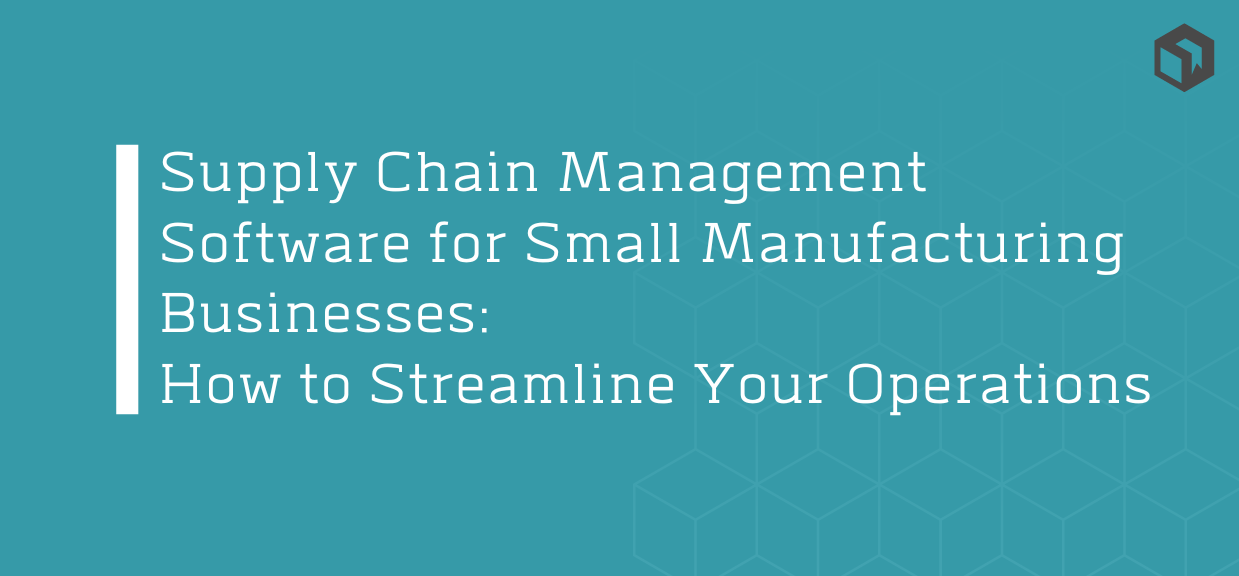Supply Chain Management Software for Small Manufacturing Businesses: How to Streamline Your Operations
If you're a startup or growing manufacturing business, then it's likely that you'll need to investigate supply chain management software. We explain supply chains and how essential it is to manage it effectively.

If you’re a small business manufacturer, then you know that keeping your supply chain running smoothly is essential to your success. Every day, decisions must be made about which products to produce, how much inventory to keep on hand, and when and where to procure materials.
If you’re looking for a way to streamline your operations and make these decisions easier, then Supply Chain Management Software may be the answer.
Need to get your raw material and product inventory under control?
Try Craftybase - the inventory and manufacturing solution for DTC sellers. Track raw materials and product stock levels (in real time!), COGS, shop floor assignment and much more.
It's your new production central.
In this article, we’ll introduce what a supply chain is, and the benefits of adopting a supply chain system to manage your entire product lifecycle: from the purchase of raw materials to your final shipped product.
What is a supply chain?
Let’s start by defining what we mean by a “supply chain”. A supply chain is a linked (“chained”) system that connects a company with its suppliers and customers.
To visualise this: the supply chain starts with the company’s suppliers, who provide the raw materials needed to make the company’s products. This pulls inventory into the supply chain that needs to be managed and tracked.
For manufacturing businesses, the supply chain then continues right through the company’s manufacturing process, where the raw materials and turned into products, ready to be sold.
Finally, the supply chain ends with the company’s customers, who then buy the products via orders. For DTC businesses, this is the end user, whilst for wholesale manufacturers this will be the retailer. In both situations, the chain is complete when the orders are delivered or shipped to the final destination.
So, why is it important for small businesses to track their supply chains?
Terms like “supply chain management” often seem like the domain of large scale corporate enterprises, with huge production lines and warehousing situations needing to be managed intricately.
However, it’s just as important for smaller operations to understand that they too need to understand and optimize their supply chains in order for their business to improve and to grow.
Let’s take a look now at some of the reasons why you should consider spending some time on your supply chain:
Supply chain planning allows businesses to buy supplies in bulk
When you have more awareness of your supply chain, you can better prepare for your upcoming manufacturing activities and thus make more accurate predictions on the raw materials you need on hand at any point in time.
A big part of this means that you can purchase materials in bulk with more confidence as you know that they will be used, instead of possibly sitting in a warehouse gathering dust.
Buying your materials in bulk allows you to take advantage of economies of scale. This means that the more units of a product you buy, the lower the unit cost will be. It often also allows you to negotiate better terms with suppliers – such as longer payment terms or discounts for early payment.
The lower you can purchase your materials at, the more profit margin you’ll have at the end of the day for the products you sell. Small improvements here can really add up in the longer term.
Reduce the likelihood of stock-outs, and disruptions to your manufacturing process
If you have a better handle on your inventory and can track where it is at all times, then you are less likely to run into issues with stock-outs.
Stock-outs (out-of-stock situations) occur when you don’t have the materials on hand that you need to keep your manufacturing process running smoothly and products rolling out the door.
If a raw material is not on hand at the point that it is needed in the production process, it can cause knock-on effects through the entire chain and may even lead to lost sales if you’re unable to ship products to customers on time.
By tracking your inventory levels and keeping a close eye on your supply chain, you can avoid stock-outs and the disruptions that they cause.
Improved customer service and communication
When you have visibility into your supply chain, you can provide your customers with better information about the status of their orders.
This improved communication will lead to happier customers as they will have a better understanding of when they can expect to receive their products. In turn, this may lead to repeat business and word-of-mouth referrals that can help your small business grow.
Minimize inventory costs by only stocking the necessary amount of inventory
One of the biggest benefits of Supply Chain Management Software is that it can help you minimize your inventory costs. When you have too much inventory on hand, it ties up valuable cash flow that could be better used elsewhere in your business.
On the other hand, if you don’t have enough inventory, you may miss out on sales opportunities or have to pay expedited shipping costs to get materials quickly.
Supply Chain Management Software can help you find the perfect balance of inventory levels, so that you’re not overspending on inventory and tying up cash flow unnecessarily.
Ensure that products are delivered on time, every time, and build your customer loyalty
Another benefit of adopting Supply Chain Management Software is that it can help you to ensure that products are available when and where they are needed in order to meet customer demand.
This is especially important for businesses that sell their products online as customers expect to be able to receive their orders quickly and without any issues.
By improving your inventory control and knowing where your products are at all times, you can avoid any delays in fulfilling orders and ensuring that customers are happy with the service that they receive.
Anticipate and react to disruptions quickly, limiting the damage to the bottom line
Supply Chain Management Software can also help you to anticipate and react to disruptions quickly, should they occur. This could be anything from a supplier not being able to meet their delivery commitment, to bad weather affecting the transportation of goods.
By knowing where your products are and who your suppliers are, you can quickly find an alternative source of materials if necessary and limit the damage to your bottom line.
Improved decision-making thanks to real-time data
Supply Chain Management Software provides you with real-time data that can be used to make informed decisions about your business. This could include anything from deciding which products to stock, to negotiating better terms with suppliers.
With the right information at your fingertips, you can make decisions that will improve the efficiency of your business and help to grow your bottom line.
Reducing waste and improving efficiency = lower production costs
By reducing waste and improving efficiency in your manufacturing process, you can lower your production costs. Supply Chain Management Software can help you to identify areas where waste is occurring and make changes to your processes to eliminate it.
For example, if you’re able to ship products directly to customers without having to store them in a warehouse first, you can save on storage costs and reduce the risk of damage to your products.
And once again, any reductions to your production costs means better margins and more money in your pocket.
Improved cash flow
Finally, Supply Chain Management Software can also help to improve your business’s cash flow.
When you have visibility on your entire supply chain network, you can see where your bottlenecks and inefficiencies are and can then take actionable measures to improve them.
As mentioned above, only having the necessary amount of raw material on hand will allow you to better manage your cash as it will not be tied up in your inventory asset account.
Ensuring you can make and deliver on sales will also improve your cashflow as you’ll reduce the amount of lost sales and refunds due to unavailable stock.
What is supply chain management software?
Enough about all the benefits, let’s now talk about what Supply Chain Management Software actually is.
Supply Chain Management Software is a combination of features that are usually offered by inventory management, MRP or ERP systems.
This type of software can help businesses to track their inventory management, make purchasing decisions, and plan production schedules.
There are many different types of Supply Chain Management Software available on the market today. Some of these programs are designed for specific industries, while others are more general.
Introducing Craftybase, the supply chain management software for small manufacturing businesses.
Craftybase is a cloud-based inventory management software solution that helps small businesses to streamline their operations and manage their supply chains more effectively.
With Craftybase, you can:
Track raw material and finished product inventory levels
Monitor stock movements, from manufacturing of sub-assemblies to external warehouse locations
Analyse your purchasing decisions
Plan production schedules
Optimize pricing and analyse costs
Generate reports on your supply chain performance
Craftybase MRP is the perfect solution for small businesses that are looking to improve their supply chain management. Try it free today!
